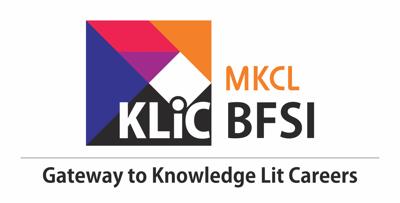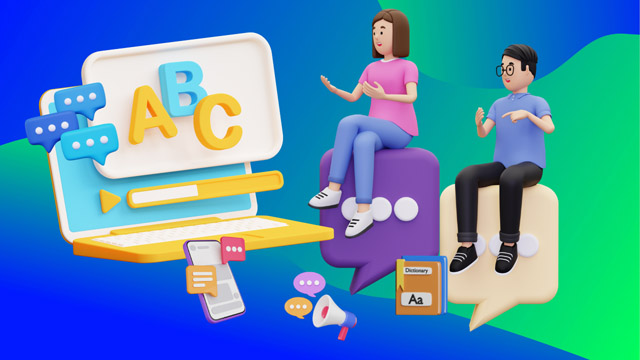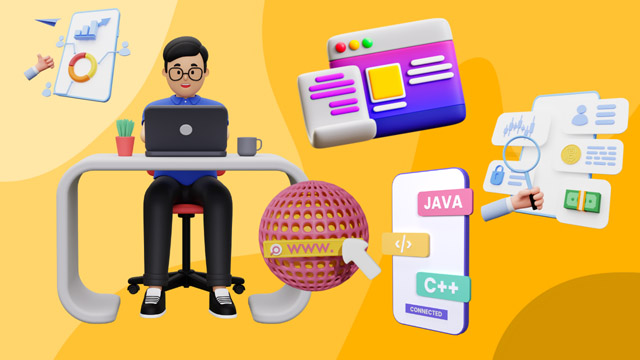Insurance industry is a crucial contributor towards India’s financial industry. The insurance industry is expanding at a rapid pace. BFSI sectors continues to offer excellent entry level career opportunities for individuals.

KLiC BFSI
The Indian banking system consists of 12 public sector banks, 21 private sector banks, 46 foreign banks, 43 regional rural banks and numerous urban cooperative as well as rural cooperative banks.
Technological development has accelerated the use of mobile and internet banking services all over the nation. The banking sector is focused to make the most of this, by improving the customer’s user experience and be ahead of competition, also creating numerous job opportunities in the process.
Introduction
Who Should Join
- Students and Graduates in Commerce, Finance, and Business Administration: To gain practical insights into banking and financial services, enhancing academic learning and career prospects.
- Aspiring Banking and Finance Professionals: To acquire foundational knowledge and skills necessary for roles such as bank operations executive, loan officer, or financial advisor.
- Insurance Agents and Financial Advisors: To deepen understanding of insurance products, risk assessment, and investment strategies, thereby improving client advisory services.
- Individuals Preparing for Banking and Financial Sector Examinations: To build a strong foundation in BFSI concepts, aiding in competitive exam preparations.
- Working Professionals Seeking Career Advancement: To update and enhance knowledge in the BFSI domain, facilitating career growth and new opportunities.
- Entrepreneurs and Small Business Owners: To understand financial products and services that can benefit their business operations and financial planning.
- Individuals Interested in Personal Financial Management: To gain insights into investment opportunities, risk management, and financial planning for personal wealth management.
What you'll learn ?
- BFSI sector provides number of opportunities for ambitious individuals with an intellectually stimulating and fast paced career path. There is a wide scope of job opportunities such as Insurance agent, Loan officer, Mutual Fund advisors, corporate bankers, consumer banking, Bank operations executive and many more.
- As e-commerce and online banking technology continue to expand, tech-savvy individuals will always be in demand. With the use of e-commerce and online banking on the rise, the demand for individuals with technical skills will always be high.
- Besides pursuing a career in BFSI Sector, being financial literate helps manage individual wealth very effectively.
Certification
- KLiC courses are recognized by Yashwantrao Chavan Maharashtra Open University (YCMOU).
- MKCL provides certificate to the KLiC learner after his/her successful course completion.
- Yashwantrao Chavan Maharashtra Open University (YCMOU) provides mark sheet to successfully passed KLiC learners (Jurisdiction: Maharashtra).
Learning Methodology
The academic approach of the courses focuses on the “work-centric” education i.e. begin with work (and not from a book!), derive knowledge from work and apply that knowledge to make the work more wholesome, useful and delightful. The ultimate objective is to empower the Learner to engage in socially useful and productive work. It aims at leading the learner to his/her rewarding career as an employee or entrepreneur as well as development of the community to which s/he belongs. Learning methodology:
- Step -1: Learners are given an overview of the course and its connection to life and work.
- Step -2: Learners are exposed to the specific tool(s) used in the course through the various real-life applications of the tool(s).
- Step -3: Learners are acquainted with the careers and the hierarchy of roles they can perform at workplaces after attaining increasing levels of mastery over the tool(s).
- Step -4: Learners are acquainted with the architecture of the tool or tool map so as to appreciate various parts of the tool, their functions, utility and inter-relations.
- Step -5: Learners are exposed to simple application development methodology by using the tool at the beginner’s level.
- Step -6: Learners perform the differential skills related to the use of the tool to improve the given ready-made industry-standard outputs.
- Step -7: Learners are engaged in appreciation of real-life case studies developed by the experts.
- Step -8: Learners are encouraged to proceed from appreciation to imitation of the experts.
- Step -9: After the imitation experience, they are required to improve the expert’s outputs so that they proceed from mere imitation to emulation.
- Step-10: Emulation is taken a level further from working with differential skills towards the visualization and creation of a complete output according to the requirements provided. (Long Assignments)
- Step-11: Understanding the requirements, communicating one’s own thoughts and presenting are important skills required in facing an interview for securing a work order/job. For instilling these skills, learners are presented with various subject-specific technical as well as HR-oriented questions and encouraged to answer them.
- Step-12: Finally, they develop the integral skills involving optimal methods and best practices to produce useful outputs right from scratch, publish them in their ePortfolio and thereby proceed from emulation to self-expression, from self-expression to self-confidence and from self-confidence to self-reliance and self-esteem!
Syllabus
- Introduction to Indian Financial system
- Introduction to Banking system with Digital banking
- General Principles of Investing
- Banking products & investment opportunities in banking sector
- Agricultural insurance, Life insurance, General insurance schemes for protection
- Risk and risk assessment in stocks/shares
- Mutual Funds and methods to invest
- Systematic Investment Plans (SIP)
- Financial analysis and credit rating of an individual
- Investment in Post Office schemes, Government bonds
- Microfinance
- Career in banking sector
- Career as a BFSI agent
- Necessary communication, networking and selling skills for career in BFSI sector
- Handling and resolving customer grievances
Evaluation Pattern
Evaluation Pattern of KLiC Courses consists of 4 Sections as per below table:
| Section No. | Section Name | Total Marks | Minimum Passing Marks |
|---|---|---|---|
| 1 | Learning Progression | 25 | 10 |
| 2 | Internal Assessment | 25 | 10 |
| 3 | Final Online Examination | 50 | 20 |
| Total | 100 | 40 | |
| 4 | SUPWs (Socially Useful and Productive Work in form of Assignments) | 5 Assignments | 2 Assignments to be Completed |
YCMOU Mark Sheet
Printed Mark Sheet will be issued by YCMOU on successful completion of Section 1, Section 2 and Section 3 and will be delivered to the learner by MKCL.
YCMOU Mark Sheet will be available only for Maharashtra jurisdiction learners.
MKCL's KLiC Certificate
The certificate will be provided to the learner who will satisfy the below criteria:
- Learners who have successfully completed above mentioned 3 Sections i.e. Section 1, Section 2 and Section 3
- Additionally, learner should have completed Section 4 (i.e. Section 4 will comprise of SUPWs i.e. Socially Useful and Productive Work in form of Assignments)
KLiC Courses Fee Structure from 01 July, 2025
KLiC 120 hour course fee applicable from 01 July, 2025 all over Maharashtra
| KLiC Course Duration | MFO: MKCL Share (Including 18% GST) |
ALC Share (Service Charges to be collected by ALC*) |
MKCL Certificate | YCMOU Marksheet |
|---|---|---|---|---|
| 120 hours (Without YCMOU Marksheet) | Rs. 1,000/- | Rs. 5,000/- | Available | Not Available |
| 120 hours (With YCMOU Marksheet) | Rs. 1,118/- | Rs. 5,000/- | Available | Available |
* ALCs can collect additional 18% GST from Learner on ALC Share
* Above mentioned fee is applicable for all Modes of KLiC Courses offered at Authorised Learning Center (ALC) and at Satellite Center
* Total fee is including of Course fees, Examination fees and Certification fees
* MKCL reserves the right to modify the Fees of Courses during the year without any prior notice and MKCL shall not be liable to anyone for any such modification/s
KLiC Courses Fee Structure upto 30 June, 2025
From 01 January 2025 onwards, the fees for all KLiC courses in ALCs of Mumbai Metropolitan Regional Development Authority (MMRDA), Pune Metropolitan Regional Development Authority (PMRDA) and Rest of Maharashtra will be applicable as shown in the table below:
KLiC Courses of 120 Hours:
| Mode | Total Fee (Rupees) |
Single Installment (Rupees) |
Two Installments (Rupees) |
| Single Installment | 6000/- | 6000/- | N/A |
| Two Installments | 6200/- | 3100/- | 3100/- |
Total fee is including of Course fees, Examination fees and Certification fees
* Above mentioned fee is applicable for all Modes of KLiC Courses offered at Authorised Learning Center (ALC) and at Satellite Center
* Total fee is including of Course fees, Examination fees and Certification fees
* MKCL reserves the right to modify the Fees of Courses during the year without any prior notice and MKCL shall not be liable to anyone for any such modification/s


